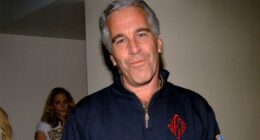Share this @internewscast.com
Then, a flight attendant came by, holding a stack of napkins.
“He says, ma’am, here’s some napkins, please cover up, it is illegal to not cover up,” Servedio recalls. “Before I could even say anything, he was telling me that it was illegal.”
Although initially rendered speechless, Servedio then asked to speak to someone else on the plane. The flight attendant grabbed a colleague. He told the colleague of his request, noting that it was “common courtesy.” Visibly horrified, Servedio says the other flight attendant grabbed her colleague’s arm, made to march him away, and looked Servedio square in the face as she said: “I am so sorry.”
The airline eventually made up for the incident after Servedio elevated the issue with customer service. They apologized, comped Servedio’s flight, provided her with travel vouchers, and let her know that hers was not the first complaint against the flight attendant and that he was no longer with the company.
Servedio feels the airline made good in retrospect. However, that didn’t help her and her son from struggling in the moment.
“I was so worked up that Leo had come off the boob and started crying, and I could not get him to calm down,” Servedio says. “In the moment, [I felt] deep humiliation, embarrassment, really unprotected, vulnerable, and afraid, honestly. I was afraid that I was going to get in trouble, even though I knew that it was perfectly in my right to be feeding my child like that.”
According to the letter of the law, Servedio is right.
What are the laws around breastfeeding on an airplane?
All 50 states have laws protecting a woman’s right to breastfeed in public, and 31 of them exempt breastfeeding from public indecency laws. Additionally, most airlines have policies proactively “allowing” and even “welcoming” breastfeeding.
Read Related Also: Patrick Vallance contradicts Rishi Sunak’s evidence to Covid inquiry
“It is your right to feed your child,” says family nurse practitioner Emily Silver, NP-C, IBCLC, the co-founder of newborn and parenting support company Nurture by NAPS, pointing to the state laws that enshrine this protection. “If someone doesn’t like it, they can look away or go away.”
Moreover, breastfeeding on a plane is actually recommended by the Centers for Disease Control (CDC) and other health experts.
Tips for breastfeeding on a plane
The CDC’s travel recommendations for nursing families include guidance to “nurse your baby during takeoff and landing when traveling by airplane. This will help to protect your child from ear pain due to cabin pressure changes.” Silver agrees with the recommendation. “The pressure changes within the cabin during take-off and landing can cause that popping or full sensation in your ears and can be uncomfortable for babies or young children,” Silver says. “I always recommend sucking for take-off or landing because of this. If you can time it so you are breastfeeding, great. You can also use a pacifier. For older toddlers or preschool-aged kids, I use lollipops, and for big kids, chewing gum can work.”
Overall, Silver suggests finding a way to feed your child that feels comfortable for you, which may mean prioritizing easy access.
“For breastfeeding on the plane, or in public, I recommend wearing a nursing tank with a soft, flexible, top over it, that way you can lift your shirt and pull down your tank to reveal your breast to latch,” Silver says. “You can invest in a nursing cover to shield your baby, however, some women find those to be restricting or hot, so wearing an easy access nursing top may feel better for you.”
Silver’s other travel tips for breastfeeding parents include:
- Know that you don’t have to have your baby with you to carry breast milk—you can fly with any amount of breastmilk, in any increments in your storage bags.
- Print out the TSA guidelines on breastmilk to have with you, just in case any TSA employee is not aware of this policy.
- Look up whether your airport has breastfeeding pods (and where they’re located) in advance so you know a private clean space where you can feed.
- Have a good cooler and breastmilk storage bags. Breast milk is good in a cooler for up to 24 hours.
- If traveling without your baby and bringing your pump, plan on carrying it on instead of checking it because if you go through security and experience a delay, you will need a way to empty your breasts.
- Remember to bring quick clean travel wipes that you can use to clean your pump parts when on the go (she recommends Medela).
An airplane can be like a societal pressure cooker: It packs people from all walks of life into one close-quartered space for an extended period of time where they have to coexist without incident. Some people who breastfeed may actually be uncomfortable doing so in a situation where their seatmate is a stranger they’re touching shoulders with, which is a perfectly okay personal choice. But for those who do want to feed their child before, during, or after becoming airborne, making breastfeeding rights and policies more commonly known can help normalize and destigmatize the practice, which is something Servedio hopes happens sooner rather than later.
While she says she’s glad she stood up for herself during her interaction with that flight attendant, she doesn’t want it to continue. “It’s obvious that these things need to be said and that we need to have these conversations,” Servedio says. “Hopefully we can make enough of an impact that not everybody’s going to have to deal with this because as a new mom, it’s just way too much pressure.”










